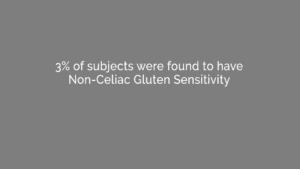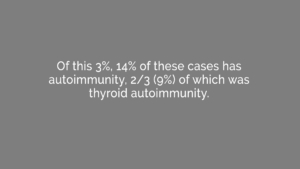Gluten Sensitivity – Prevalence & Association with Thyroid Autoimmunity
Let’s discuss prevalence of gluten sensitivity, and how often it is associated to autoimmunity, including thyroid autoimmunity. The information we will discuss will help to counter-balance the overzealous dialogue that permeates gluten discussion. Thus providing you with accurate and reasonable guidelines regarding gluten in your diet.
In this study, with over 12,000 patients, they were looking to see if patients had Non-celiac gluten sensitivity (NCGS) or not. (They were not looking to disprove gluten sensitivity).
- 3% of subjects were found to have NCGS
- In the US, NCGS estimates range from 0.6-6%
- Of the 3% that had gluten sensitivity
- 14% of these cases had autoimmunity of some kind
- 9% of which was Thyroid Autoimmunity
Other noteworthy conclusions:
- 30% of NCGS cases may resolve after treating another underlying GI issue – SIBO, FODMAP, Colitis etc.
- They found that over 90% of people had a discernible reaction within 24 hrs of reintroducing gluten.
**Full study summary available here, subscription required
Download this Episode (right click link and ‘Save As’)
Dr. Michael Ruscio: Hi, this is Dr. Ruscio. Let’s discuss how prevalent is non-celiac gluten sensitivity or, said more simply, being gluten sensitive. And also, how commonly is being gluten sensitive associated to autoimmune conditions? And more specifically, we’ll discuss thyroid autoimmunity.
Now, we’ve discussed bits and pieces of this multicenter Italian study in the past. But I wanted to tie together a few of the more important aspects of this to help provide you with a better understanding of how prevalent gluten sensitivity is to help give you a more realistically calibrated expectation regarding, do you have a problem with gluten, or do you not have a problem with gluten?
And unfortunately, I think we’ll need to juxtapose what the science actually says, which will be somewhat contrasting to what popular belief may have you thinking.
So let me start by putting the abstract up here on the screen. “An Italian Prospective Multicenter Survey on Patients Suspected of Having Non-celiac Gluten Sensitivity.” In this study a group of physicians worked to ascertain if patients had gluten sensitivity or not.
This was certainly not a group of physicians who were looking to disprove gluten sensitivity. In fact, they came up with a very comprehensive, roughly 60-point examination looking at everything from lab testing to physical examination to subjective questioning to really get a good, accurate assessment. And let’s go through some of their findings.
Three percent of the subjects were found to have non-celiac gluten sensitivity. Now, this was in Italy. And one of the most quick rebukes to this comment is, “Well, it’s different in the United States. There’s more glycophosphate use. There might be more genetically modified wheat.” Okay. So that’s fine. That’s certainly an argument. It’s a speculative argument. So we want to be careful not to just take a speculative point that has no data to support it and inflate that to mean something substantial.

This same paper also cites that in the United States, the reported prevalence of non-celiac gluten sensitivity ranges from 0.6% up through 6%. So maybe more common in the United States.
However, even if the data in the United States was underreporting at the 6% of the population and if you wanted to be as liberal with the assignment or the prevalence of non-celiac gluten sensitivity as you could be, let’s say for argument’s sake it was 10% of the population. In this case, we have data showing 0.6 to 6%. But for argument’s sake, let’s say 10%. That is likely still far less than one has been led to believe according to things that they may read or hear on the internet.
And this may not be anyone’s fault. It may just be that the caution and the discerning language is often not used regarding conversations about gluten. We often see this very extreme language being used, or very vague language being used, leaving the health consumer to fill in the gaps in terms of, “Okay. I’ve heard gluten can be very problematic for some people. It can cause thyroid autoimmunity. It can cause inflammation. It can cause leaky gut.”
But along with that narrative, very seldom do you have delivered the information educating you on the prevalence. So again, to say it simply, if you go on the internet and perform some reading, you may easily be led to believe that the vast majority of people have a problem with gluten. And that is a stark contrast to what we’re seeing reported in this study where up to 6% of the population has a problem with gluten.
So it’s very important to keep this in mind so that you can prevent yourself from being indoctrinated to think you have a problem with gluten in absence of any experiential data that supports that.
Sponsored Resources
We’ve discussed previously that your mouth is the first section of your gut. So in order to have a healthy gut, you have to have a healthy mouth. That’s why I like Quip’s Electric Toothbrush, which is ADA approved. That’s the American Dental Association.
Quip provides an effective, two-minute cleaning with vibrations and guiding pulses that will alert you to when to switch sides. The timed guiding pulses combined with the soft bristles help prevent over-brushing, which can be a serious contributing factor to gum disease. And I can personally say that this has helped me.
What I like about Quip also is that their electric toothbrush starts at $25, which is much cheaper than most electric toothbrushes. If you go to GetQuip.com/RuscioPodcast, you’ll get your first refill pack free with a purchase of Quip’s Electric Toothbrush. That’s your first refill pack free at GetQuip.com/RuscioPodcast.
Okay, continuing, regarding the association to autoimmunity. So of this 3% in this study sample—by the way, this study sample was 12,225 patients. So it’s a good sample size. Of the 3% that had the gluten sensitivity, 14% of those patients had autoimmunity in general of any type. So that’s definitely significant. And of that 14%, 9% had thyroid autoimmunity.

So yes, there is legitimacy to the claim that you can have non-celiac gluten sensitivity in association with autoimmune conditions. And the thyroid seems to be the most prevalent of those.
However, it’s very important to keep in mind that this was 9%. I routinely see patients who come in being led to believe that if you have thyroid autoimmunity, you can never have any gluten ever. And I am certainly all for being progressive and trying to find dietary methods of managing any condition.
However, there is a cost to making overzealous dietary recommendations which is the psychosocial difficulty that is accompanied by a strict, 100% gluten-free diet where I think a gluten-reduced diet would be a much more practical endeavor for most people. You gain the benefit. And it seems that, again, not everyone needs to be fully gluten free as this study is supporting.
Again, I am happy to look at data showing that everyone with thyroid autoimmunity must be 100% gluten free. But if you have an honest objective look at the data, I don’t think that’s there. Yes, it is legitimate. Yes, people with autoimmunity have an increased risk of being gluten sensitive. But is it everyone? No.
In fact, it’s probably the minority of people rather than the majority. Should you go through a gluten elimination and then reintroduction? 100%. I think that is totally a viable suggestion. However, it’s important to have a reasonable outlook so that you don’t self indoctrinate yourself into thinking that you have a problem with gluten when you actually don’t. You should be looking for a discernible reaction.

And as this study also found, the majority—over 90% of patients—upon gluten reintroduction, will have a discernible, symptomatic reaction within 24 hours. So to the argument that you may have this thyroid autoimmunity that’s being fueled by gluten and it may never manifest symptomatically for weeks or months or years, again, I’m open. But I don’t see great data to support that.
In fact, I think that hurts more people than helps people because I see people come in who are orthorexic. They’re afraid of food. And they’re avoiding gluten strictly 100% of the time even though when we have them go into a gluten reintroduction they seem to be okay with gluten. Some people are very reactive, yes. But there’s a number of people who actually feel better when they loosen up their diet a little bit and enjoy the ease of having fewer dietary restrictions.

And that’s actually a nice segue to the next point which is that 30% of these non-celiac gluten sensitive patients were able to resolve their symptoms after addressing another issue in the gut. So essentially, they had another problem in the gut that was making them look or appear like they had gluten sensitivity. This includes SIBO, FODMAP sensitivity, colitis.
And again, this is likely part of the reason why in the clinic we see people able to reintroduce gluten without much of a problem. Some people never had a problem to begin with. And they were indoctrinated into thinking that they do. Other people had an underlying gut imbalance, if you will, that was leading to what looked like gluten sensitivity. But they actually were not. And when they cleaned up that problem, they were able to tolerate gluten.

So hopefully, this helps calibrate you more proximal to what the data actually shows regarding gluten sensitivity. And if you’re struggling with this, I would offer you the protocol that I outline in Healthy Gut, Healthy You, which is my book that walks you through a self help plan. It will help you navigate these confusing waters of rectifying your gut health.
Gluten sensitivity is definitely something to consider as part of your dietary approach. But not everyone has a problem with gluten. Not everyone has to be 100% gluten free. And some people will have an underlying problem in the gut that’s presenting as what looks like gluten sensitivity. But they actually are able to eat gluten, at least to some degree, once they rectify that problem.
So again, hopefully this is helpful. This is Dr. Ruscio. And I hope this information helps you get healthy and get back to your life. Thanks!
Dr. Michael Ruscio is a DC, natural health provider, researcher, and clinician. He serves as an Adjunct Professor at the University of Bridgeport and has published numerous papers in scientific journals as well as the book Healthy Gut, Healthy You. He also founded the Ruscio Institute of Functional Health, where he helps patients with a wide range of GI conditions and serves as the Head of Research.➕ Links & Resources
- Volta U, Bardella MT, Calabrò A, Troncone R, Corazza GR; Study Group for Non-Celiac Gluten Sensitivity. An Italian prospective multicenter survey on patients suspected of having non-celiac gluten sensitivity. BMC Med. 2014 May 23;12:85. doi: 10.1186/1741-7015-12-85. PMID: 24885375; PMCID: PMC4053283.
- Healthy Gut, Healthy You
- Dr. Ruscio’s Additional Resources




Discussion
I care about answering your questions and sharing my knowledge with you. Leave a comment or connect with me on social media asking any health question you may have and I just might incorporate it into our next listener questions podcast episode just for you!